PakAlumni Worldwide: The Global Social Network
The Global Social Network
Pakistan's Human Development in Musharraf Years- Highest in Pakistan's History
Pakistan's HDI grew an average rate of 2.7% per year under President Musharraf from 2000 to 2007, and then its pace slowed to 0.7% per year in 2008 to 2012 under elected politicians, according to the 2013 Human Development Report titled “The Rise of the South: Human Progress in a Diverse World”.
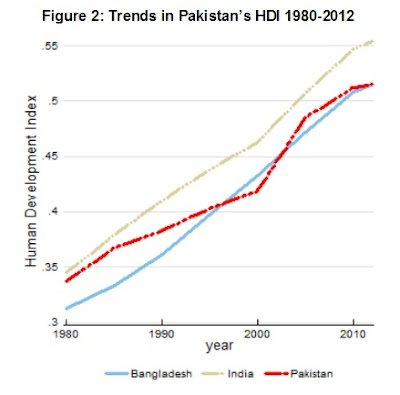 |
| Source: Human Development Report 2013-Pakistan |
At 0.515, Pakistan's HDI is lower than the average HDI value of 0.558
for South Asia which is the second lowest among the various regions of the world tracked by UNDP. Between
2000 and 2012, the region registered annual growth of 1.43% in HDI
value, which is the highest of the regions. Afghanistan achieved the
fastest growth (3.9%), followed by Pakistan (1.7%) and India (1.5%),
according to the United Nations Development Program.
Overall, Pakistan's human development score rose by 18.9% during Musharraf years and increased just 3.4% under elected leadership since 2008. The news on the human development front got even worse in the last three years, with HDI growth slowing down as low as 0.59% — a paltry average annual increase of under 0.20 per cent.
Who's to blame for this dramatic slowdown in the nation's human development? Who gave it a low priority? Zardari? Peoples' Party? Sharif brothers? PML (N)? PML (Q)? Awami National Party? Muttahida Qaumi Movement? The answer is: All of them. They were all part of the government. In fact, the biggest share of the blame must be assigned to PML (N).
Sharif brothers weren't part of the ruling coalition at the center. So why should the PML (N) share the blame for falling growth in the nation's HDI? They must accept a large part of the blame because education and health, the biggest contributors to human development, are both provincial subjects and PML(N) was responsible for education and health care of more than half of Pakistan's population.
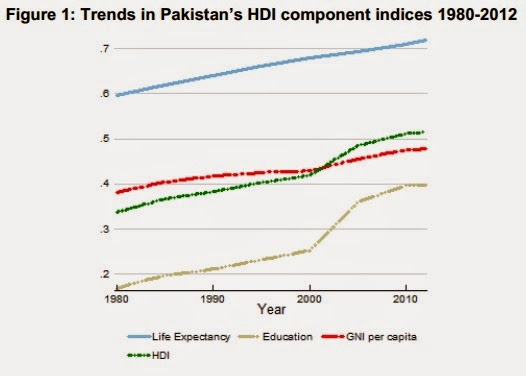 |
| Source: The Rise of the South: Human Progress in a Diverse World |
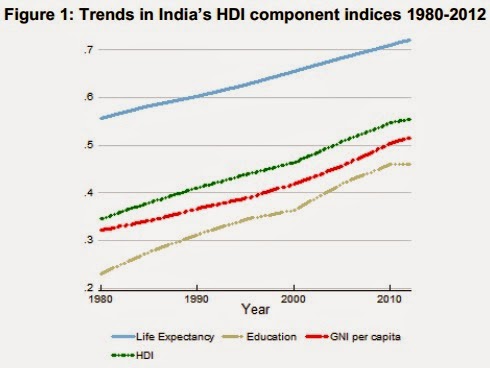 |
| Source: The Rise of the South: Human Progress in a Diverse World |
Going further back to the decade of 1990s when the civilian leadership of the country alternated between PML (N) and PPP, the increase in Pakistan's HDI was 9.3% from 1990 to 2000, less than half of the HDI gain of 18.9% on Musharraf's watch from 2000 to 2007.

Acceleration of HDI growth during Musharraf years was not an accident. Not only did Musharraf's policies accelerate economic growth, helped create 13 million new jobs, cut poverty in half and halved the country's total debt burden in the period from 2000 to 2007, his government also ensured significant investment and focus on education and health care. The annual budget for higher education increased from only Rs 500 million in 2000 to Rs 28 billion in 2008, to lay the foundations of the development of a strong knowledge economy, according to former education minister Dr. Ata ur Rehman. Student enrollment in universities increased from 270,000 to 900,000 and the number of universities and degree awarding institutions increased from 57 in 2000 to 137 by 2008. In 2011, a Pakistani government commission on education found that public funding for education has been cut from 2.5% of GDP in 2007 to just 1.5% - less than the
annual subsidy given to the various PSUs including Pakistan Steel and PIA, both of which continue to sustain huge losses due to patronage-based hiring.
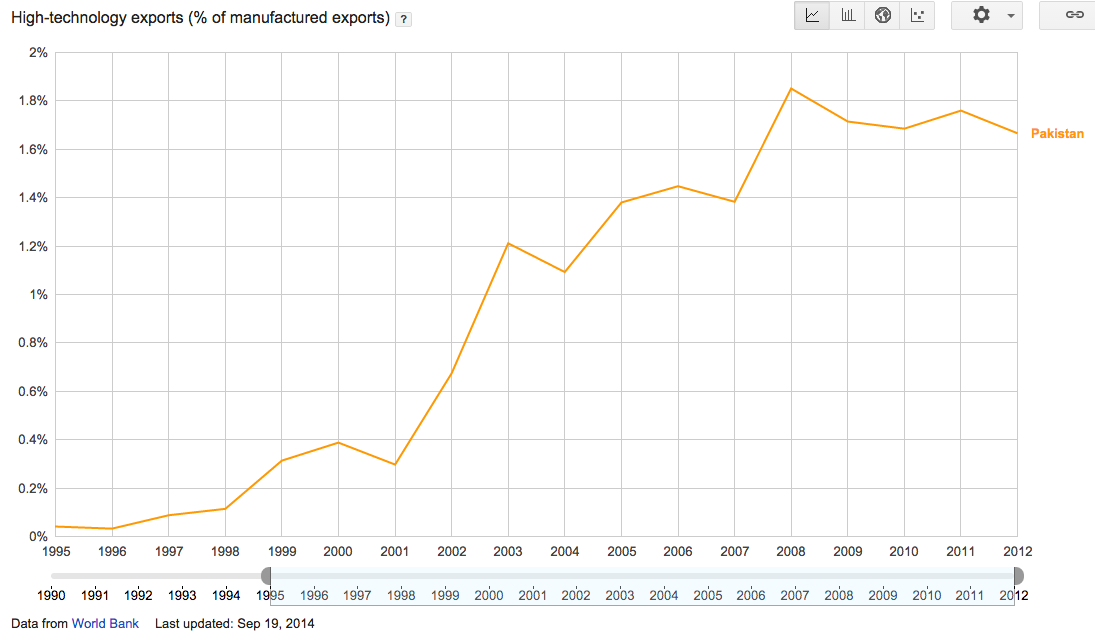 |
| Pakistan's High-Tech Exports Tripled as % of Manufactured Exports. ... |
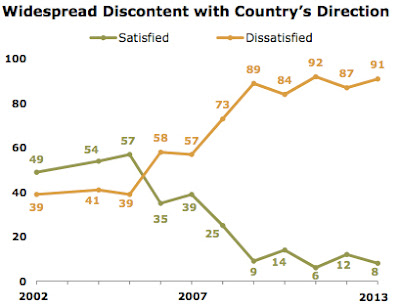 |
| Source: Pew Surveys in Pakistan |
Looking at examples of nations such as the Asian Tigers which have achieved great success in the last few decades, the basic ingredient in each case has been large social sector investments they have made. It will be extremely difficult for Pakistan to catch up unless similar investments are made by Pakistani leaders.
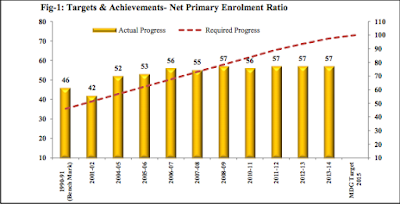 |
| Primary Enrollment Source: Economic Survey of Pakistan |
 |
| Youth Literacy Rate Source: Economic Survey of Pakistan |
As Pakistanis prepare to go to the polls on May 11, it is important that the voters demand an explanation from the incumbent political parties for their extremely poor performance in the social sector. Without accountability, these politicians will continue to ignore the badly needed investments required to develop the nation's human resources for a better tomorrow. Forcing the political leaders to prioritize social sector development is the best way to launch Pakistan on a faster trajectory.
Here's a video discussion on elections in Pakistan:
Upcoming Elections in Pakistan: How different parties are positioni... from WBT TV on Vimeo.
Related Links:
Haq's Musings
Saving Pakistan's Education
Political Patronage Trumps Public Policy in Pakistan
Dr. Ata-ur-Rehman Defends Pakistan's Higher Education Reforms
Twelve Years Since Musharraf's Coup
Musharraf's Legacy
Pakistan's Economic Performance 2008-2010
Role of Politics in Pakistan Economy
India and Pakistan Compared in 2011
Musharraf's Coup Revived Pakistan's Economy
What If Musharraf Had Said No?
-
Comment by Riaz Haq on December 26, 2013 at 4:52pm
-
Here's a News Op Ed by Dr. Ata ur Rehman Khan on Musharraf's time in office:
In the agricultural sector a number of important irrigation projects were initiated. The Diamer Bhasha Dam was launched. The Mangla Dam was raised by 30 feet increasing 2.9 maf water storage capacity and 100MW electricity. A number of new dams and canals were built (Mirani Dam for Balochistan, Subukzai Dam for Balochistan and Gomal Zam Dam for KP; Kachi Canal from Taunsa to Dera Bugti and Jhal Magsi to irrigate 713,000 acres of barren cotton producing land, the Thal Canal for Punjab, Rainee Canal for Sindh).
Overall three million acres of barren land were brought under cultivation. The Right Bank Outfall Drain (RBOD) was constructed through Sindh, thereby saving Indus River and Manchar Lake (Sind) from pollution. The steps taken led to an increase in wheat production from 14 million tons to 22 million tons, and increase in cotton production from nine million bales to 13 million bales.
Price control was exercised on essential items. The prices of edible household items (flour, naan, milk, tea, sugar, meat, vegetable oil etc) have tripled or quadrupled in the last five years. A rotational loan system was introduced through banks for poor farmers and loan facility for farmers increased from Rs35 billion through ZTBL only, to Rs160 billion from all other private banks.
Overall 2900MW of electricity was added to national generation capacity. The new energy projects initiated included the Ghazi Barotha hydro electricity project (1600MW), the Chashma-II nuclear electricity plant (300MW). The Neelum-Jhelum hydroelectricity project was initiated (1800 MW), the Satpara Power project in Skardu, and the Naltar power project in Gilgit.
A true revolution was brought about in the telecommunications sector. The number of mobile phones increased from 600,000 in the year 2000 to over 7 crore in 2006. Tele-density was increased from 2.9 percent to over 70 percent, and millions of jobs were created in the telecom sector. The IT sector also saw a phenomenal growth with internet connectivity spreading rapidly, particularly during 2000-2003 from 40 cities to over 2000 towns of Pakistan.
Fibre optic connectivity increased from 30 cities to over 1500 towns of Pakistan in the same period. The bandwidth cost of two megabytes was reduced sharply from $86,000 to $3,000 per month. Pakistan’s first satellite PakSat 1 was placed in space. Industry prospered as never before and industrial growth was in double figures throughout the nine-year period.
A revolution was brought about in the higher education sector with the establishment of the Higher Education Commission. The annual allocation for higher education was increased from only Rs500 million in 2000 to Rs28 billion in 2008, thereby laying the foundations of the development of a strong knowledge economy. Student enrolment in universities increased from 270,000 to 900,000 and the number of universities and degree awarding institutes increased from 57 in 2000 to 137 by 2008.
This rapid transformation deeply worried India and a detailed presentation was given to the Indian prime minister on July 22 about the dramatic progress in Pakistan.
A number of steps were taken to strengthen democracy at the grassroots. A large number of new TV channels were allowed and the media given full freedom. The local government system was launched to empower the people through a third tier of government. Women were empowered politically through reserved seats at all tiers of government. Minorities were provided with the system of joint electorate. ....
http://www.thenews.com.pk/Todays-News-9-222331-Lest-we-forget
-
Comment by Riaz Haq on August 1, 2014 at 8:31am
-
The annual UNDP human development index is out for the year, and it is not good news for Pakistanis. We stay at the same position as last and many previous years at 146th among 187 countries. Pakistan is 11 points lower than India, which starts at 135. India and Bangladesh have each improved one position. Bangladesh has slightly better ranking than us. The Human Development Index offers the best method of measuring human progress and ranking of countries thus far. The index takes into account multiple factors like gender equality, poverty, education, health, access to primary services, infant mortality and life expectancy. Covering a broad range of dimensions of human progress or lack of it, the index has become an acceptable international standard.
Unfortunately, the announcement of the index for the past several years has passed without serious debate and comment in our political circles, media and the think tank community. Barring few occasional comments and review in a few policy-research institutions, no discussion takes place in a serious fashion. Why? Because those who are responsible for human development planning, and more importantly execution of policy at the provincial and district levels, can get away with their failure.
How we can do better depends a lot on knowing first why we are doing so poorly in human development. Three reasons are important to ponder over. First, the demand pull from the peoples and communities at the local level is neither well organised through community organisation, nor is it strong enough to get the bureaucracy at the district level and the political bosses at provincial and federal levels sensitive to basic human needs. The first step should be sensitising people and communities about their rights and energise them enough to question the quality of services at the local level. In my view, when communities become more and more development conscious, they put more and more pressure on the bureaucracy and the public representatives to provide services.
http://tribune.com.pk/story/742593/why-pakistan-is-low-on-human-dev...
-
Comment by Riaz Haq on September 25, 2015 at 8:39pm
-
#Pakistan’s army: Hail to the chief. Military riding wave of popularity http://econ.st/1iO4tnF via @TheEconomist
THE image of a mustachioed man with peaked cap and a chest full of medals is becoming hard to avoid in Pakistan. It is splashed across the posters of a politician competing in a by-election in the eastern city of Lahore. It looms large on giant billboards in the port city of Karachi, apparently paid for by adoring citizens. And it is a rare day when Pakistan’s chief of army staff is not pictured on a newspaper front page. He has even entered the colourful repertoire of artists who decorate the nation’s trucks and rickshaws.
The apotheosis of General Raheel Sharif (pictured, wearing beret) makes it harder than ever for his unrelated namesake, Nawaz Sharif, who is prime minister, to claw back powers from an army that has directly and indirectly controlled Pakistan for most of its history. Nawaz Sharif’s election victory in 2013 resulted in the country’s first transfer of power from one civilian government to another. But the extent of his authority is debatable: the army is reasserting itself.
This marks quite a turnaround for an institution that eight years ago was so unpopular that off-duty soldiers in the most restive areas were advised not to wear their uniforms in public. The long rule of General Pervez Musharraf, a coup-maker, had seriously tarnished the army’s prestige. A particular setback was the violence unleashed in central Islamabad in 2007 when General Musharraf decided to clear out a pro-Taliban mosque in the heart of the city. The army was humiliated in 2011 when the public discovered Osama bin Laden had been hiding next to the country’s officer-training school and that American special forces had been able to penetrate deep into Pakistan to kill him.
Today the army is riding high, buoyed by an improvement in security following a decision in June 2014 to launch an all-out campaign against the Pakistani Taliban. Many credit General Sharif with taking the initiative. Operation Zarb-e-Azb has seen key towns in the former Taliban sanctuary of North Waziristan retaken by the state. Militants have been hunted down elsewhere, particularly in Karachi, which had been a major centre of Taliban activity. All this work has helped cut militant violence by nearly half in the last nine months, according to the Pakistan Institute of Peace Studies, a think-tank in Islamabad.
At the same time the army has been waging a public-relations war, promoting General Sharif as a star. The media dutifully report on his every visit to the front lines and publish photographs of every honour-guard he inspects during his numerous overseas trips.
That General Sharif should receive more than usual publicity is understandable given the country remains mired in a bloody internal conflict. On September 18th 13 Taliban suicide-fighters fought their way into a residential compound of Pakistan’s air force near the city of Peshawar and killed 29 people. Sustaining public support for a war against Islamist militants is tricky given that many on the religious right sympathise with the Taliban’s goal of a strict sharia state and often avoid condemning their means of achieving it.
-
Comment by Riaz Haq on August 30, 2016 at 4:42pm
-
Departing UNDP Official on Pakistan:
1 Pakistan's Progress on Development Isn't Fast Enough
Mr. Franche is quoted as saying he is frustrated that a country full of “capable and intelligent” people isn’t making more progress on reducing poverty and modernizing the state. “The fact that even in 2016, Pakistan has 38% poverty; it has districts that live like sub-Saharan Africa; that the basic human rights of minorities, women and the people of FATA [tribal regions in the northwest] are not respected; that this country has not been able to get its act together and hold a census; or that it has not been able to push for reforms in FATA, an area that is institutionally living in 17th century. It is extremely preoccupying,” he said.
2 The Country's Political Class 'Uses Its Power to Enrich Itself'
The UNDP official said the country’s elites needed to change their lives to help Pakistan. “You cannot have a political class in this country that uses its power to enrich itself, and to favor its friends and families. This fundamental flaw needs to be corrected if Pakistan is to transform into a modern, progressive developed country,” he is quoted as saying.
He said elites take advantage of cheap labor while partying in London, shopping in Dubai and investing in property abroad: “The elite needs to decide, do they want a country or not,” he is quoted as saying.
Mr. Franche also had a word for the propertied classes. “I have visited some very large landowners, who have exploited the land for centuries, paid nearly zero money for the water, and how they almost sometimes hold people in bondage. And then they come to the United Nations or other agencies and ask us to invest in water, sanitation, and education for the people in their district. I find that quite embarrassing,” he is quoted as sayin
3 Local Governments Need Real Power
Mr. Franche said provincial governments in Pakistan don’t have enough power. “Only KP [the Khyber-Pakhtunkhwa province] has a decent law that gives real power and real money to the local government. Local government does not mean that you just elect them and deny them fiscal resources or power,” he said.
4 Pakistan's Media Is 'Manipulated'
He also said the media should be one of the pillars of democracy, but “unfortunately, the level of dependence of the government on military authorities, and the degree by which a lot of media in this country is manipulated by powerful sources, are sources of erosion of democracy and erosion of the institutions that are the foundations of this country.”
5 Country Needs More Opportunities
“The apartheid of opportunities in Pakistan is horrible, which is why so many young people are trying to leave the country,” Mr. Franche is quoted as saying.
“Pakistan will not be able to survive with gated communities where you are completely isolated from the societies, where you are creating ghettos at one end and big huge malls for the rich at the other end. It is not the kind of society you want your kids to live in.”
http://blogs.wsj.com/briefly/2016/08/30/5-criticisms-un-official-ma...
-
Comment by Riaz Haq on November 23, 2016 at 1:11pm
-
Via @NPR: Phillip Reeve on train ride thru #Pakistan finds the Army is very popular in the country.
http://www.npr.org/2016/11/23/503108897/after-27-hours-our-train-ri...
REEVES: Glacier - that's the Siachen Glacier, the world's highest battlefield. It's a giant sweep of ice and snow nearly 20,000 feet up in the Himalayan Mountains. A standoff between the Pakistani and Indian armies has been going on there for more than 30 years. There's been intermittent fighting. But the real killers are the weather and the altitude. Life up there is very harsh, says Ali.
ALI: (Through interpreter) There's very little oxygen. Breathing is difficult, and you never feel like eating. There are many hardships.
REEVES: Extreme cold and also avalanches have claimed many hundreds of lives over the years. Ali worries about frostbite.
ALI: (Through interpreter) You can get frostbite on the ear, on the nose, on the fingers. If you get it on any part of the body, then it must be amputated, as there's no cure.
REEVES: Ali's in good spirits today. He's heading home on our train to his wife to begin one month's leave. He set off from the mountains four days ago and still has one more day of travel. Ali's 24 and a sepoy. That's the same as a private. He signed up for the Pakistani military at 17 but didn't want to.
ALI: (Through interpreter) I joined because my father ordered me.
REEVES: Ali says he really wanted to be in the Navy. But now, he's gotten used to the army and the tough conditions.
ALI: (Through interpreter) Despite all that, I now enjoy it.
REEVES: People on our train seem to treat Ali with much respect. Pakistanis we've met on this journey are profoundly disillusioned with their government yet strongly approve of their army. Their nation's spent roughly half of its history and some of its darkest years under military dictatorship, yet some Pakistanis say they'd be happy to get rid of their elected civilian government and be ruled by generals again. Zaman Saeed's an anti-narcotics official and a passenger on this train.
ZAMAN SAEED: (Through interpreter) It would be better. Pakistan would improve.
REEVES: Saeed would like the military to run the country, but just for a few years.
SAEED: (Through interpreter) They should spend three years sorting out all crocodiles who commit corruption and destroy Pakistan. After that, there's no harm restoring democracy.
REEVES: Pakistanis tend to revere their military because they believe it's done a great job reducing violence in recent years by driving the Pakistani Taliban out of the mountains bordering Afghanistan and going after militant outfits in Karachi. The army's harsh tactics cause deep resentment in some areas, though, like Balochistan province, where there's a separatist insurgency.
But we're traveling through Pakistan's heartland - the provinces of Punjab and Sindh. Here, the army has many fans. And a sharp surge in tensions with the old foe, India, seems to be making the military even more popular. Twenty-seven hours after setting out, we're arriving.
The outskirts of Karachi look pretty shabby - lots of slums, narrow alleys, lots of trash on the ground, motorbikes trying to squeeze their way down these tiny lanes, animals, washing hanging out, lots of little kids wandering about.
(SOUNDBITE OF TRAIN BRAKING)
REEVES: Our train draws in. This is the giant metropolis, the port city that makes most of the money that fuels Pakistan's economy.
There we are - Karachi.
The platform's crowded with porters in long, dark-green robes, carrying baggage on their heads. That conversation on the train about an army takeover has left me wanting to learn more. Could Pakistan's military really rule again one day? I get a cab to the Karachi Press Club. The club has a history of challenging dictators. It doesn't allow anyone in military uniform through its doors.
-
Comment by Riaz Haq on October 5, 2021 at 7:57am
-
Look at the #economic growth trend in #SouthAsia! #Pakistan #economy grew rapidly in 2000-2008 during #Musharraf years!! And then the bottom fell out!!! Bitter fruit of kleptocracy disguised as "democracy"??? #PPP #PMLN #PTI #PandoraPapers https://www.economist.com/asia/2021/10/05/pakistan-got-its-way-in-a...
https://twitter.com/haqsmusings/status/1445398625698336770?s=20
Mr Khan’s current diplomatic offensive comes in the context of the dwindling options bequeathed by his country’s feeble economy, hypocrisy over Xinjiang and long history of double-dealing. “Pakistan is trying to use Afghanistan to rehabilitate itself,” says Michael Kugelman of the Wilson Center, an American think-tank. “Its message is that we were right all along, there never was a military solution, so it is wrong to blame us.” What Pakistan now wants is for other countries to lend a hand, and help shore up the Taliban government as the only way of sustaining regional stability. The trouble is that just as Pakistan’s leaders imagine the country’s strategic significance to have grown because it holds unique influence over the Taliban, the West’s withdrawal has entailed a steep decline in its interest in the region.
Mr Khan may well be right that the best hope for preventing a humanitarian disaster in Afghanistan now, and for keeping a grip on jihadist groups that linger on its blood-soaked soil, is to help the Taliban keep a lid on things. “If Afghanistan destabilises, the spillover effect comes to Pakistan,” says Moeed Yusuf, Mr Khan’s national security adviser. “After Afghanistan we are the biggest victim of the past four decades and we are not interested in going there again.” But coming from a country that has for so long run with the foxes while hunting with the hounds, as Pakistan has, such words carry limited credibility. ■
-
Comment by Riaz Haq on September 8, 2022 at 10:19am
-
HUMAN DEVELOPMENT
REPORT 2021/2022https://hdr.undp.org/system/files/documents/global-report-document/...
World set back by 5 years on development indices
India falls from 131 to 132 mainly on back of 2.5 years reduction in life expectancy
BD forges ahead from 140 to 129
Pakistan falls from 154 to 161- in low HDI category now
Comment
- ‹ Previous
- 1
- 2
- 3
- Next ›
Twitter Feed
Live Traffic Feed
Sponsored Links
South Asia Investor Review
Investor Information Blog
Haq's Musings
Riaz Haq's Current Affairs Blog
Please Bookmark This Page!
Blog Posts
India's Modi Brags About Ordering Transnational Assassinations
In a campaign speech on May 1, Indian Prime Minister Narendra Modi bragged about his campaign of transnational assassinations of individuals he has labeled "terrorists". “Today, India doesn't send dossiers to the masters of terrorism, but gives them a dose and kills them on their home turf", he is reported to have said, according to a tweet posted by his BJP party. Last…
ContinuePosted by Riaz Haq on May 3, 2024 at 5:09pm
Pakistanis' Insatiable Appetite For Smartphones
Samsung is seeing strong demand for its locally assembled Galaxy S24 smartphones and tablets in Pakistan, according to Bloomberg. The company said it is struggling to meet demand. Pakistan’s mobile phone industry produced 21 million handsets while its smartphone imports surged over 100% in the last fiscal year, according to …
ContinuePosted by Riaz Haq on April 26, 2024 at 7:09pm
© 2024 Created by Riaz Haq.
Powered by
![]()


You need to be a member of PakAlumni Worldwide: The Global Social Network to add comments!
Join PakAlumni Worldwide: The Global Social Network